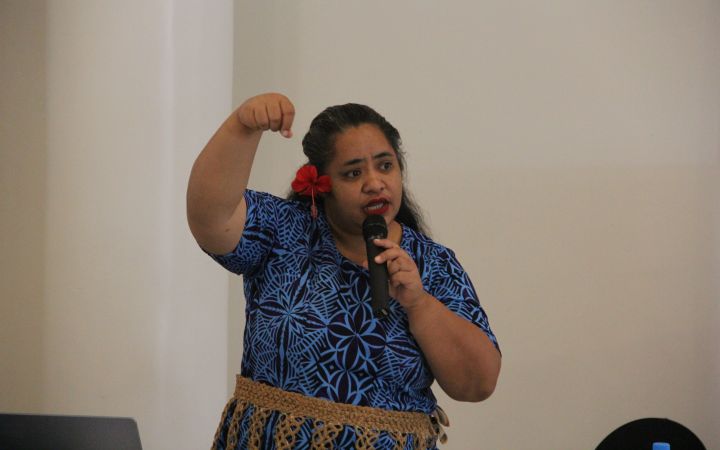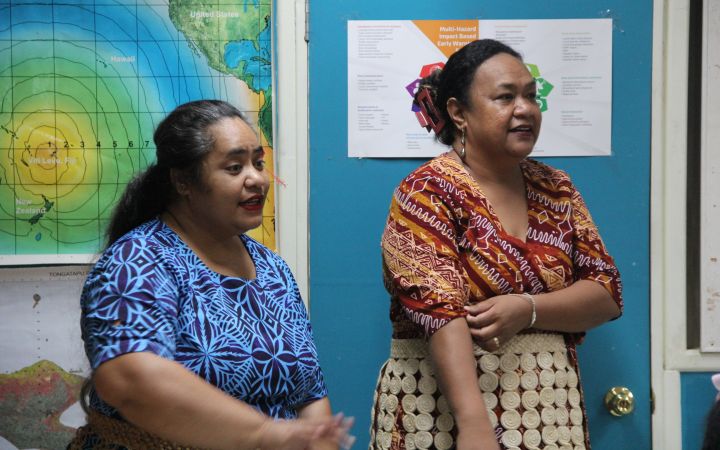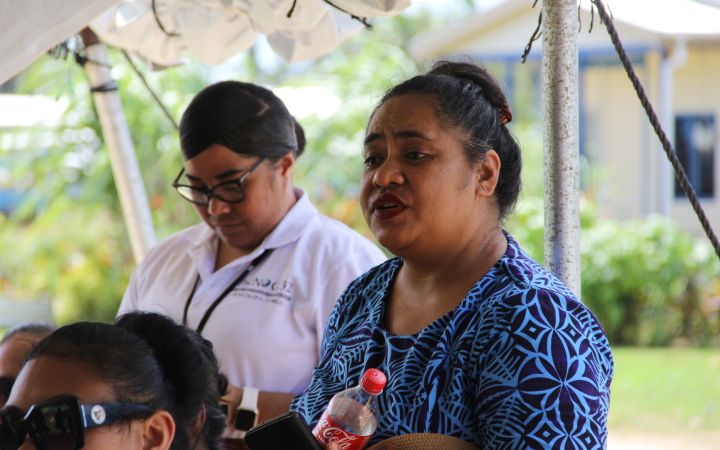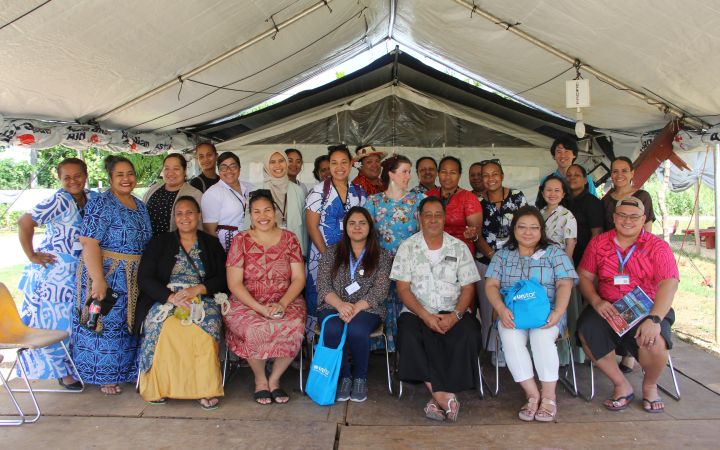- Luisa Taunga, Secretary at Tonga’s National Disaster Risk Management Office, leads the Research and Training division focusing on disaster preparedness and response.
- In 2017, Luisa joined the first cohort of the UNITAR women’s leadership and disaster risk reduction training. She returned as a resource person for the 2023 training.
- Tonga’s vulnerability to disasters causes major challenges, particularly for remote islands with limited resources.
- Inspired by what she saw in Japan, Luisa designed and ran disaster risk reduction workshops for children and youth to increase community awareness.
27 November 2024, Hiroshima, Japan - Luisa Taunga is Assistant Secretary at the National Disaster Risk Management Office in Tonga, where she heads the Research and Training Division, focusing on disaster preparedness, training and response strategies to ensure that communities are well-equipped to handle emergencies. She was a participant in one of the earliest cohorts of the UNITAR disaster risk reduction training programme, in 2017. Having since established herself as a leader in building community-level preparedness and resilience to disasters, Luisa returned as a facilitator for the cycle 2023 UNITAR disaster risk reduction programme.
Learning from Japan's Tsunami Experience
In 2017, Luisa – still new to the disaster management field – joined the second cycle of the UNITAR Women’s Leadership in Tsunami-based Disaster Risk Reduction Training Programme. Since 2016, the programme has been implemented with the support of the Government of Japan, to empower women from small island states to enhance their skills in disaster preparedness and management in their countries.
33 women from small island nations in the Pacific visited Japan to learn from the country’s experiences from disasters including the 2011 Great East Japan Earthquake and Tsunami. Through classroom learning and field visits, the programme offered participants a comprehensive view of disaster management.
Visiting tsunami-affected areas, interacting with local heroes and hearing their stories brought the realities of disaster to life for Luisa. She especially recalls her visit to Okawa Primary School, which had been devastated by the 2011 tsunami.
I was one of the most talkative people in that cohort. [But] the first site visit, we went to the school where about 70 plus percent of the students didn’t make it. And from that day on, I couldn't make the site visits. I would just sit in the bus and wait until everybody comes back, because I [was] thinking about where I was deployed.” − Luisa Taunga
As a disaster risk management officer in Tonga, Luisa had at the time been assigned to the remote islands of Ha’apai. Luisa describes the islands as “very flat, as a pancake”. The remote geography and terrain of Tonga makes it highly vulnerable to disasters such as tsunamis and earthquakes. Indeed, the 2022 Hunga Tonga–Hunga Ha’apai volcanic eruption and tsunami affected more than 80 per cent of the Tongan population. The country’s geographical remoteness, limited resources and infrastructure make it difficult for the government to ensure that remote islands receive timely assistance and support during emergencies.
Preparing Communities through the Children and Youth
Since the UNITAR training, Luisa has overseen research and coordinates with stakeholders to improve her country’s disaster response capabilities. Inspired by the school visits in Japan, she designed and ran workshops in primary schools, simplifying the content but ensuring that the children understood disaster risk reduction and how to get to safety.
Training the children also means reaching their parents. “The children, they never leave their parents at home. So they'll be the ones reminding them about [disasters] and preparing beforehand and all that”, says Luisa.
Another idea that she took back from Japan was to train the youth through disaster risk reduction workshops. “I saw this in Japan with the schools that we visited – the youth [were] the arms and hands of the people in the communities because they're strong and resilient. They're able to evacuate people quickly”, she says.
Disaster risk reduction workshops in the communities also link governmental policies with community actions. Luisa views such community trainings as essential to make sure the government decisionmakers hear from the communities.
It's not just about empowering the people in the community, but also making sure that the dialogue between decision makers and those on the community level is ongoing. [Through the community trainings,] we’re able to speak to them on their level and give them an opportunity for their voices to be heard.” − Luisa Taunga
As a Trainer
Luisa returned to UNITAR as a trainer. The workshop was the first time the UNITAR programme was held in the Pacific, giving participants the chance to celebrate the culture and family of the Pacific Islands as well as learn from the experiences of small island countries. In Luisa’s view, having the people from Tonga speak of their experiences from the 2022 volcanic eruption and tsunami brought the participants to the realities on the ground, reflecting both the successes and the challenges of disaster management in a small Pacific Island country.
Having experienced the 2022 volcanic eruption and tsunami, Luisa notes that one thing she forgot to learn in Japan was how to deal with the emotions of being affected by and witnessing disasters. Bringing the training to Tonga this year, just a few years after the disaster, was itself emotional. “It's still raw”, she says. “At least we've had a few years where we've mellowed down and taken time to think about it.”
Luisa deeply appreciates the support from the Government and People of Japan. The valuable lessons learned from disaster management in Japan continues to support her efforts in Tonga to strengthen local disaster response capabilities and community resilience.
Luisa encourages fellow disaster risk reduction professionals to prioritize community engagement and education. By fostering a collaborative approach and empowering local communities, she believes that important progress can be made in reducing disaster risks and building strong societies.
United Nations Online Volunteer Janitta Intarak contributed to this article.
ABOUT UNITAR
The United Nations Institute for Training and Research (UNITAR) is a dedicated training arm of the United Nations. In 2023, UNITAR trained over 540,000 learners around the world to support their actions for a better future. UNITAR has a global presence, with offices in Geneva, Hiroshima, New York and Bonn and networks around the world. Find out more at www.unitar.org





